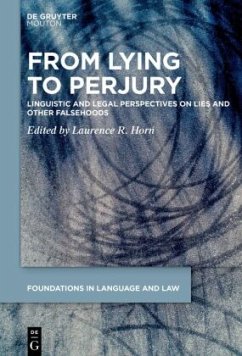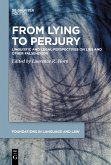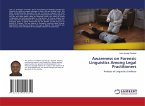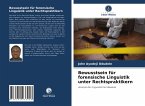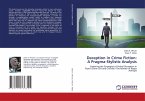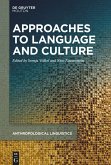This volume provides new insights on lying and (intentionally) misleading in and out of the courtroom, a timely topic for scholarship and society. Not all deceptive statements are lies; not every lie under oath amounts to perjury-but what are the relevant criteria? Taxonomies of falsehood based on illocutionary force, utterance context and speakers' intentions have been debated by linguists, moral philosophers, social psychologists and cognitive scientists. Legal scholars have examined the boundary between actual perjury and garden-variety lies.
The fourteen previously unpublished essays in this book apply theoretical and empirical tools to delineate the landscape of falsehood, half-truth, perjury, and verbal manipulation, including puffery, bluffing, and bullshit. The papers in this collection address conceptual and ethical aspects of lying vs. misleading and the correlation of this opposition with the Gricean pragmatic distinction between what is said and what is implicated. The questions of truth and lies addressed in this volume have long engaged the attention of scholars in linguistics, philosophy, psychology, cognitive science, organizational research, and the law, and researchers from all these fields will find this book of interest.
Hinweis: Dieser Artikel kann nur an eine deutsche Lieferadresse ausgeliefert werden.
The fourteen previously unpublished essays in this book apply theoretical and empirical tools to delineate the landscape of falsehood, half-truth, perjury, and verbal manipulation, including puffery, bluffing, and bullshit. The papers in this collection address conceptual and ethical aspects of lying vs. misleading and the correlation of this opposition with the Gricean pragmatic distinction between what is said and what is implicated. The questions of truth and lies addressed in this volume have long engaged the attention of scholars in linguistics, philosophy, psychology, cognitive science, organizational research, and the law, and researchers from all these fields will find this book of interest.
Hinweis: Dieser Artikel kann nur an eine deutsche Lieferadresse ausgeliefert werden.

